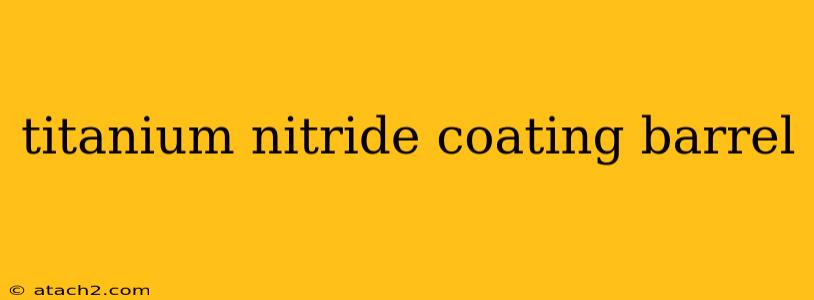Titanium nitride (TiN) coating has revolutionized various industries, and its application to barrels is no exception. This durable and high-performance coating significantly improves the functionality and lifespan of barrels used in diverse applications, from firearms to industrial machinery. This article delves into the benefits, applications, and considerations of using TiN-coated barrels.
Understanding Titanium Nitride Coating
TiN is a ceramic material known for its exceptional hardness, high wear resistance, and low friction coefficient. Applying a TiN coating to a barrel creates a thin, incredibly strong layer that protects the underlying substrate from damage and enhances its performance characteristics. The coating process typically involves a physical vapor deposition (PVD) technique, resulting in a uniform and tightly bonded layer.
Key Properties of TiN Coating:
- Exceptional Hardness: TiN boasts a hardness rivaling that of some tool steels, providing superior resistance to scratches, abrasion, and wear.
- High Wear Resistance: This translates to a longer barrel lifespan, reducing the need for frequent replacements or repairs.
- Low Friction Coefficient: This minimizes friction between the projectile and the barrel, resulting in smoother operation and reduced wear on both components.
- Corrosion Resistance: TiN offers good protection against corrosion, extending the barrel's lifespan even in harsh environments.
- Improved Heat Dissipation: In some cases, TiN coatings can improve heat dissipation, preventing overheating and ensuring consistent performance.
- Enhanced Luster: The coating often provides a distinctive golden color, enhancing the aesthetic appeal of the barrel.
Applications of TiN-Coated Barrels
The benefits of TiN coating make it suitable for a wide array of applications:
Firearms:
- Increased Accuracy: Reduced friction leads to improved projectile consistency and accuracy.
- Extended Barrel Life: The coating resists wear, enabling the barrel to maintain its accuracy and performance for a longer period.
- Reduced Cleaning Requirements: The low friction and corrosion resistance properties minimize fouling and simplify cleaning.
Industrial Machinery:
- Improved Efficiency: Reduced friction translates to less energy consumption and increased efficiency in industrial processes.
- Extended Tool Life: The high wear resistance of TiN protects the barrel from damage, prolonging its useful life and reducing downtime.
- Enhanced Durability: Protection against corrosion and abrasion is crucial in demanding industrial environments.
Other Applications:
TiN-coated barrels are also used in various other applications, including:
- Medical equipment
- Aerospace components
- Automotive parts
Considerations When Choosing a TiN-Coated Barrel
While TiN coating offers numerous advantages, there are some factors to consider:
- Cost: TiN coating is generally more expensive than untreated barrels.
- Coating Thickness: The thickness of the coating influences its performance and durability; thicker coatings typically offer better protection but might add extra weight.
- Substrate Compatibility: The underlying material of the barrel must be compatible with the TiN coating process to ensure proper adhesion and performance.
- Application Requirements: The specific application will determine the necessary coating thickness, hardness, and other properties.
Conclusion: The Advantages Outweigh the Costs
The enhanced performance, extended lifespan, and improved durability offered by titanium nitride coating make it a worthwhile investment for many barrel applications. While the initial cost might be higher, the long-term benefits, including reduced maintenance, increased efficiency, and prolonged service life, significantly outweigh the extra expense. The choice to utilize a TiN-coated barrel is a strategic decision that prioritizes superior performance and longevity.

